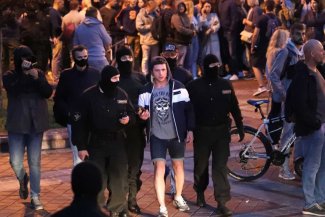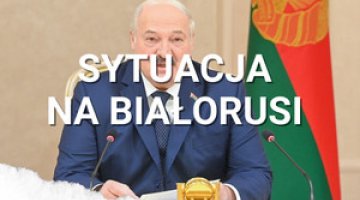Repressions being administered in small doses. The third week of political crisis in Belarus

Since the mass demonstration on Sunday in the centre of Minsk (with an estimated 100,000–150,000 participants), the dynamism of the protests has decreased significantly. A similar trend was observed last week, following the first mass demonstration on 16 August. In the past few days, protests were traditionally held in Minsk, Hrodna and Brest, as well as in smaller cities such as Maladechna and Zhodzina. Each demonstration was attended by several thousand people, not more. There are still signs of discontent in workplaces, but none of them managed to hold a general strike to stop production. Workers from the Grodno Azot plant in Hrodna (nitrogen fertilisers) and the BelAZ plant in Zhodzina (construction vehicles) were the most active. The Coordination Council for the Peaceful Transfer of Power, established last week, called on citizens to join it en masse, so on 26 August the body already had around 2,000 members. At the same time, the leaders of the council, including the former minister of culture and diplomat Pavel Latushka, initiated the procedure (envisaged in the Belarusian electoral law) to dismiss deputies of the lower house of parliament. The reason for this is primarily the failure to intervene against the brutal actions of the law enforcement agencies. Currently, such actions have been taken with regard to 20 out of 110 deputies.
Since Monday, the authorities have intensified repressions against the most active leaders and protest participants. Some of them have been detained and sentenced to ten days' imprisonment, including Volha Kavalkova, who is a member of the council presidium, and chair of strike committees in two Minsk-based plants: MTZ (tractor production) and MZKT (arms production). In turn, the leader of the workers' protests at Grodno Azot, Yury Ravavy, has taken refuge in Poland and asked for asylum. In addition, the Investigative Committee called for interrogations of the members of the presidium of the council, including Pavel Latushka and the Nobel Prize winner, Svetlana Alexievich.
In the last two days, OMON has been daily detaining dozens of participants of the demonstrations taking place in the centre of Minsk. No brutal force or mass pacifications of demonstrators have been used, though. Alyaksandr Lukashenka has resumed the traditional narrative about external interference (he again accused Warsaw of wanting to annex the Hrodna region), while his accusations against the demonstrators were accompanied by populist rhetoric, which had been almost absent in recent weeks. On 25 August, during a meeting devoted to economic policy, he clearly stressed that – regardless of the condition of public finances – it was necessary to maintain the current level of wages in the public sector and pensions, with particular emphasis on veterans' benefits. Lukashenka’s confidant, Aleh Haydukevich, a member of the House of Representatives, proposed convening an emergency session of the parliament in order to involve the legislature in settling the situation in the country. In recent days, the demand for foreign currency has increased significantly, mainly for euros and dollars, which led to some shortages in bureaux de change. As a result, the exchange rate of the Belarusian rouble against these currencies fell by more than 5%. The costs of servicing the Belarusian Eurobonds worth US$1.25 billion issued in June this year has also increased.
Commentary
- After two consecutive Sunday saw a culminating demonstration, the dynamism of the protests fell more than last week. The decline in protest mood is particularly noticeable in heavy industry, which is an effect of increasing pressure from plant management, as well as the increasing number of strike committee leaders being detained. The high level of social dissatisfaction continues, but the determination of the protesters is clearly diminishing and their disorientation is growing due to the absence of strong leaders inside the protest movement and the unity inside the ruling camp.
- Since the government has not been interested in dialogue with its opponents, the coordination council has decided to resort to the existing (though never used) procedure for dismissing deputies. This move is intended to exert broad public pressure on the parliament, which is formally responsible for scheduling new elections. However, it is hard to expect a rebellion among MPs, most of whom have been loyal to the regime and, furthermore, politically passive. One sign of crisis in the council’s activity was its quite unexpected appeal to citizens to join its work en masse, which in practice is turning it into a broad social protest movement opposed to the government rather than a body formed by experts and politicians responsible for a peaceful transfer of power.
- The law enforcement forces, which remained passive during the Sunday demonstration, have been noticeably more active since Monday. The detentions of demonstration leaders and active participants have been aimed at gradually reducing the protest mood by intimidating and demobilising rebellious citizens. At the same time, the scale of these actions, which has so far been small, may also be an attempt to test the public's readiness to defend the detainees and the potential for the escalation of protests in response to the resumption of repression. Unless resistance is manifested firmly, the regime is likely to resort to tougher measures until the situation on the streets is completely under its control.
- Lukashenka has resorted to populism in his rhetoric in order to complement the narrative about the external ‘threat’ and ‘anti-state’ intentions of the demonstrators. He is thus trying to restore at least part of the social guarantees that were the pillars of his power in previous years. At the same time, the government may pretend it wants to start dialogue, e.g. in parliament, in the coming weeks, as suggested by the initiative of Aleh Haydukevich, a close aide of the president. Currently, given the unprecedented public outrage, the regime will not be able to regain the confidence of the rebellious citizens, and the promises will only consolidate the electorate loyal to Lukashenka.
- The first economic effects of the political crisis are becoming visible. According to the Belarusian government’s preliminary estimates, the demonstrations have cost the country (including production cuts at some plants) US$500 million. On the other hand, the increase in the costs of servicing Eurobonds and the problems in the currency market are symptoms of a decline in the state's credibility, both in foreign markets and in the eyes of citizens. These problems, for the time being, are only a sign of a serious collapse of a national economy which has been struggling with recession since the beginning of the year (GDP fell by 1.6% between January and July).




